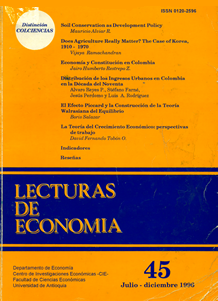Economía y constitución en Colombia
DOI:
https://doi.org/10.17533/udea.le.n45a4955Abstract
En este artículo se presenta una lectura de la Constitución colombiana, de 1991, bajo una perspectiva económica. La lectura es realizada siguiendo un enfoque descriptivo y teniendo en cuenta cuatro materias básicas en las cuales se clasifica el contenido de la constitución, seleccionado para tal fin: desarrollo económico, aspectos macroeconómicos, aspectos microeconómicos y ordenamiento territorial. En general, se encuentra que los asuntos económicos generan un espacio considerable en la Constitución.
Además, en el artículo se considera un seguimiento sobre el desarrollo legal y práctico de los dos aspectos que constituyeron las principales reformas económicas, con un gran acento institucional, y los mismos que se encuentran actualmente en el centro del debate, propiciado por el gobierno actual del presidente Samper, para modificar la Constitución. Se trata de la banca central y el federalismo fiscal y este debate permite sugerir que el caso colombiano constituye una buena evidencia empírica acerca de los problemas de acción colectiva.
Downloads
Downloads
Published
How to Cite
Issue
Section
License
This page, by Universidad de Antioquia, is licensed under a Creative Commons Attribution License.
Authors who publish with this journal agree to retain copyright and grant the journal right of first publication, with the article licensed under a Creative Commons Attribution-NonCommercial-ShareAlike License allowing others to share it as long as they acknowledge its authorship and original publication in this journal.
Authors can enter into separate, additional contractual arrangements for the non-exclusive distribution of the journal's published version of the work (e.g., post it to an institutional repository or publish it in a book), provided that these arrangements be not for profit and the journal be acknowledged as the original source of publication.
Authors are permitted and encouraged to post their papers online (e.g., in institutional repositories or on their websites), as it can lead to valuable exchanges as well as greater citation of the published work.







